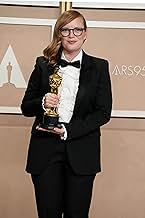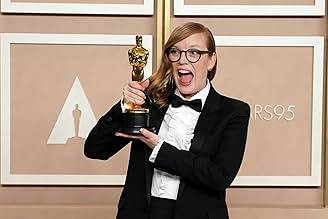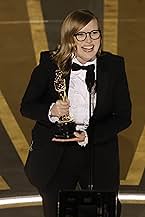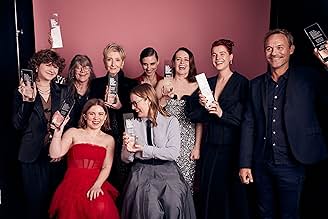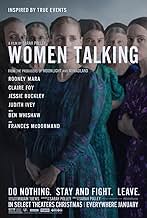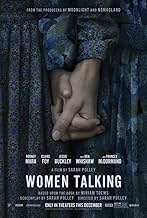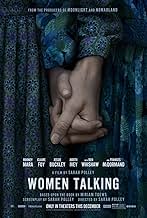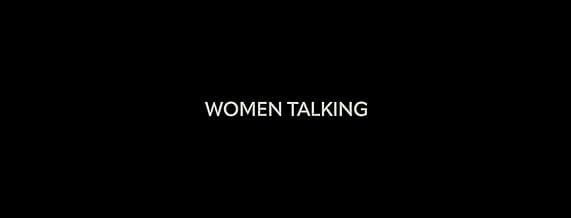En 2010, les femmes d'une communauté religieuse isolée s'efforcent de concilier leur réalité avec leur foi. Basé sur le roman de Miriam Toews.En 2010, les femmes d'une communauté religieuse isolée s'efforcent de concilier leur réalité avec leur foi. Basé sur le roman de Miriam Toews.En 2010, les femmes d'une communauté religieuse isolée s'efforcent de concilier leur réalité avec leur foi. Basé sur le roman de Miriam Toews.
- A remporté 1 oscar
- 65 victoires et 164 nominations au total
Avis en vedette
Sarah Polley's 'Women Talking' did not work for me. This story of a group of women - all of whom belong to a U. S. religious sect in the 1960's - who are physically and emotionally abused by their menfolk / husbands, seems more like a dispassionate, politically correct lecture, than a dialogue between real people. Real people in pain. And it should not have had that effect. Particularly in these times when the news is filled with detailed descriptions of what real men do to real women.
Rooney Mara, Claire Foy, and. Jesse Buckley play three young women who had been drugged and sexually accosted, and who are now part of a 'commission' asked to decide what the community's women's next steps should be. Should they remain in the community and say / do nothing, remain and fight back, or pack up and leave? In making their decision, each of the three young women describes their lives and their reasons for voting as they do. Rooney Mara's character seems the most undecided, willing to see all sides of the argument and taking different positions over the course of the film. Claire Foy is angry and outspoken but I found it difficult to ascribe a preferred next-step to her. Jesse Buckley is the angriest and, at first, the most unwilling to leave her abusive husband, and it is that - her failure to realize how abused she is - that made me care less about her than I should.
Two senior women participate in the commission and one, played by Judith Ivey - made the strongest impression on me. She has the wisdom that comes with age and the ability to put it into words. Ben Whishaw as the one man invited to the commission brings a startling honesty to the proceedings; he more than anyone knows the evil men can do.
But for me, the film's 'failure' involves the three young women. There is a cold and distanced quality to their recitals. It is as though they are relating a film they saw, a book they read, rather than expressing the anger, the anxiety, the fear they all know very well.
I should have been moved. I should have been angered. I should have been relieved. But I was not.
Rooney Mara, Claire Foy, and. Jesse Buckley play three young women who had been drugged and sexually accosted, and who are now part of a 'commission' asked to decide what the community's women's next steps should be. Should they remain in the community and say / do nothing, remain and fight back, or pack up and leave? In making their decision, each of the three young women describes their lives and their reasons for voting as they do. Rooney Mara's character seems the most undecided, willing to see all sides of the argument and taking different positions over the course of the film. Claire Foy is angry and outspoken but I found it difficult to ascribe a preferred next-step to her. Jesse Buckley is the angriest and, at first, the most unwilling to leave her abusive husband, and it is that - her failure to realize how abused she is - that made me care less about her than I should.
Two senior women participate in the commission and one, played by Judith Ivey - made the strongest impression on me. She has the wisdom that comes with age and the ability to put it into words. Ben Whishaw as the one man invited to the commission brings a startling honesty to the proceedings; he more than anyone knows the evil men can do.
But for me, the film's 'failure' involves the three young women. There is a cold and distanced quality to their recitals. It is as though they are relating a film they saw, a book they read, rather than expressing the anger, the anxiety, the fear they all know very well.
I should have been moved. I should have been angered. I should have been relieved. But I was not.
A group of women from a small religious community discuss various violent acts, beatings and rape.
It is a heavy going watch, a film that manages to intrigue, sicken and inform. Some of the content, some of what you'll hear will genuinely lower your opinion on human nature, the harrowing acts some people can commit.
The best element for me, the acting, if I had to pick out a standout, I'd argue Claire Foy did a supreme job, but the likes of Ben Wishaw and Frances McDormand were excellent also.
I feel like it plays out like a stage play, I can only imagine how powerful some of the content would play out in a small, intimate theatre, one or two bits maybe get a little lost in translation onto the big screen.
I've read some very impressive reviews about this film, some people have spoken candidly about first hand experience of violence, that has clearly given them a different perspective on the film.
At times I felt a little bit like an outsider looking in, and sometimes I couldn't relate, or get into it, some of the sequences felt just a tad slow, some threads were explored but not tied up, I suppose that's just normal in such circumstances.
It's definitely a powerful time, and one that's very, very relevant in today's day and age, a time where women's rights seem to be being downplayed somewhat.
I would recommend it.
7/10.
It is a heavy going watch, a film that manages to intrigue, sicken and inform. Some of the content, some of what you'll hear will genuinely lower your opinion on human nature, the harrowing acts some people can commit.
The best element for me, the acting, if I had to pick out a standout, I'd argue Claire Foy did a supreme job, but the likes of Ben Wishaw and Frances McDormand were excellent also.
I feel like it plays out like a stage play, I can only imagine how powerful some of the content would play out in a small, intimate theatre, one or two bits maybe get a little lost in translation onto the big screen.
I've read some very impressive reviews about this film, some people have spoken candidly about first hand experience of violence, that has clearly given them a different perspective on the film.
At times I felt a little bit like an outsider looking in, and sometimes I couldn't relate, or get into it, some of the sequences felt just a tad slow, some threads were explored but not tied up, I suppose that's just normal in such circumstances.
It's definitely a powerful time, and one that's very, very relevant in today's day and age, a time where women's rights seem to be being downplayed somewhat.
I would recommend it.
7/10.
You go to bed then wake up bruised, bloody, quite groggy and confused; you know instantly, that your body's been abused, your mind cannot conceive, all the torment and the grief, but you're not the only one, that's being used. So the women of the colony convene, to discuss the implications of what's been, carry on like there's no wrong, stay and fight which might prolong, or leave this place, put barriers between. The conversations, confrontations ebb and flow, the picture of what's taken place is shown, anguish, misery and despair, amongst a culture built on prayer, where the men have their own rules, their manifesto.
It's a wonderful piece of filmmaking that engages from the outset with great dialogue, a disturbing story, and an empowering conclusion - with outstanding performances throughout.
It's a wonderful piece of filmmaking that engages from the outset with great dialogue, a disturbing story, and an empowering conclusion - with outstanding performances throughout.
It's an ensemble drama set within 24 hours in 2010 in an unknown location. It follows the conversation of three generations of women discussing how to respond to the sexual abuse and rape experienced by many women in the colony over the previous years.
The conversation occurs while the colony's men are away in the city, raising bail for colony men arrested for sexual crimes. Eight women participate in most of the discussion. Two grandmother matriarchs are Agata (Judith Ivey) and Greta (Sheila McCarthy). The next generation includes Ona (Rooney Mara), an unmarried woman pregnant with a child resulting from rape. Mariche (Jessie Buckley) is married to a very abusive husband. Salome (Clare Foy) is Ona's younger married sister who is very angry over the abuse of her young daughter. Some girls from the next generation provide comments and some narration to the film. Scarface Janz (Frances McDormand), another matriarch, leaves the discussion early. Since the women are illiterate (only boys go to school), they ask the schoolteacher, August (Ben Whishaw), to record their discussion. August, who had left the colony with his mother, was university-educated but was allowed to return to teach school.
The film shows no sexual violence but does show some results of the violence. The only adult male face seen throughout is that of August. The women discuss three options: staying and forgiving the perpetrators, staying and fighting the perpetrators, or leaving with all the children under a certain age. They must make a quick decision because one of the men is returning from the city in the evening. The decision taken by the group is a very "Mennonite" one.
I had a lot of ambivalence going into the film. I didn't like the novel when I read it several years ago. The author closely tied the story to accounts of crimes in one of Bolivia's very conservative Mennonite groups. However, the novel's nuanced dialogue was far beyond illiterate Mennonite women without education who could not even read a map. And a university-educated August would never be allowed back to teach in such a conservative colony.
Sarah Polley extracts the story from Mennonite specificity (the film never mentions the word and doesn't mention "Mennonite" last names). Polley uses very subdued colors in the filming, reinforcing the conservative impression. Although the movie's setting still looks Mennonite, its greater abstraction allowed me to focus on the issues being discussed--rage, forced ignorance, the necessity of faith and how to reconcile this faith with what happened, how best to embody their pacifist ethic, etc. The discussion is wide-ranging and doesn't provide easy and ready solutions. Rooney Mara, Claire Foy, and Jessie Buckley are excellent as they express contrasting and shifting perspectives.
"Women Talking" probably needs to be seen multiple times to get all the layers. The Mennonite context sells the movie, but for me, it only made sense to push that representation to the rear. I wish critics would focus on it less. The film's ending unfolds a little too slowly once their decision has been made.
The conversation occurs while the colony's men are away in the city, raising bail for colony men arrested for sexual crimes. Eight women participate in most of the discussion. Two grandmother matriarchs are Agata (Judith Ivey) and Greta (Sheila McCarthy). The next generation includes Ona (Rooney Mara), an unmarried woman pregnant with a child resulting from rape. Mariche (Jessie Buckley) is married to a very abusive husband. Salome (Clare Foy) is Ona's younger married sister who is very angry over the abuse of her young daughter. Some girls from the next generation provide comments and some narration to the film. Scarface Janz (Frances McDormand), another matriarch, leaves the discussion early. Since the women are illiterate (only boys go to school), they ask the schoolteacher, August (Ben Whishaw), to record their discussion. August, who had left the colony with his mother, was university-educated but was allowed to return to teach school.
The film shows no sexual violence but does show some results of the violence. The only adult male face seen throughout is that of August. The women discuss three options: staying and forgiving the perpetrators, staying and fighting the perpetrators, or leaving with all the children under a certain age. They must make a quick decision because one of the men is returning from the city in the evening. The decision taken by the group is a very "Mennonite" one.
I had a lot of ambivalence going into the film. I didn't like the novel when I read it several years ago. The author closely tied the story to accounts of crimes in one of Bolivia's very conservative Mennonite groups. However, the novel's nuanced dialogue was far beyond illiterate Mennonite women without education who could not even read a map. And a university-educated August would never be allowed back to teach in such a conservative colony.
Sarah Polley extracts the story from Mennonite specificity (the film never mentions the word and doesn't mention "Mennonite" last names). Polley uses very subdued colors in the filming, reinforcing the conservative impression. Although the movie's setting still looks Mennonite, its greater abstraction allowed me to focus on the issues being discussed--rage, forced ignorance, the necessity of faith and how to reconcile this faith with what happened, how best to embody their pacifist ethic, etc. The discussion is wide-ranging and doesn't provide easy and ready solutions. Rooney Mara, Claire Foy, and Jessie Buckley are excellent as they express contrasting and shifting perspectives.
"Women Talking" probably needs to be seen multiple times to get all the layers. The Mennonite context sells the movie, but for me, it only made sense to push that representation to the rear. I wish critics would focus on it less. The film's ending unfolds a little too slowly once their decision has been made.
The fact that the movie is set in 2010 and is based on a true story is not easy to believe. The way things unfold, one would think it is at least in the 50s at the latest for the most part. But the way some cults work, and how people fall for them and spend generations in them is a sad truth of our world. Even though it can be technically called a chamber piece, it doesn't feel like one. There's so much in writing and directing that adds novelty to the story which is not exactly something groundbreaking. There are little moments throughout the film that makes the situation more weird and real at the same time that most films don't do.
Le saviez-vous
- AnecdotesExplaining the color grading of the film, director Sarah Polley said the filmmakers played with saturation levels to create a feeling of "a world that had faded in the past." This is why the film appears to be almost black and white, but not quite.
- GaffesNettie identifies as a man name "Melvin". The Mennonite do not allow members to identify as anything other than their biological sex and gender. In real life, Nettie would have been excommunicated. There are over one hundred different Anabaptist (Amish, Brethren, Hutterite, Mennonite) church groups, counting more than 6,000 congregations, all holding to slightly different traditions and their own interpretations of the Bible. The movie never identified the Anabaptist group of the colony.
- Bandes originalesDaydream Believer
Written by John Stewart
Performed by The Monkees
Courtesy of Rhino Entertainment Company
By arrangement with Warner Music Group Film & TV Licensing
Meilleurs choix
Connectez-vous pour évaluer et surveiller les recommandations personnalisées
Détails
- Date de sortie
- Pays d’origine
- Site officiel
- Langue
- Aussi connu sous le nom de
- Women Talking
- Lieux de tournage
- Enercare Centre, 100 Princes' Boulevard, Toronto, Ontario, Canada(Barn interior scenes)
- sociétés de production
- Consultez plus de crédits d'entreprise sur IMDbPro
Box-office
- Brut – États-Unis et Canada
- 5 456 531 $ US
- Fin de semaine d'ouverture – États-Unis et Canada
- 40 530 $ US
- 25 déc. 2022
- Brut – à l'échelle mondiale
- 9 276 103 $ US
- Durée
- 1h 44m(104 min)
- Couleur
- Rapport de forme
- 2.76 : 1
Contribuer à cette page
Suggérer une modification ou ajouter du contenu manquant







